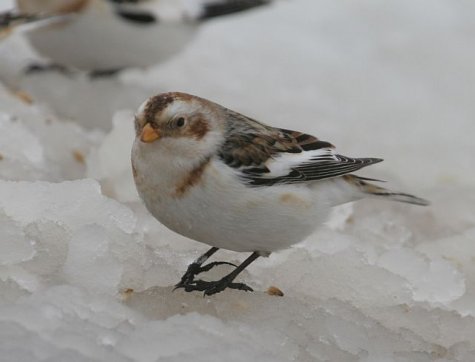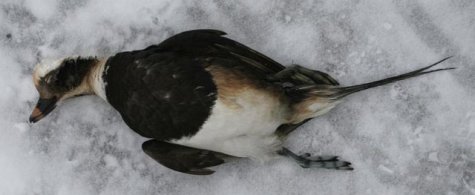Birder's diary - 28.02
Birder: Margus Ots, linnuvaatleja.ee
Translation: Liis
February 28th
Snow bunting (28.02.2012 Sõrve säär)
Spring is said to have been seen already at the Sõrve bird station but in the morning I felt no desire to get out to the seaside bunker for birdwatching; a proper snow storm raged outside. And because the sea around Sõrve säär had frozen again overnight nothing much was left to do than inspect the bird feeding grounds near the bird station. The 30 skylarks that had stopped here on their migration were all still here on the beach, their companions, the snow bunting flock, had however increased to 100 birds. At the bird station’s feeder 6 hawfinches, 15 bramblings, 10 chaffinches, and 10 blackbirds were busy besides the hordes of greenfinches and great tits but those were no recent arrivals, they had been here all the winter.
Two new species were added to my year list today. At the bird feeding ground was a wood pigeon and on the shore three stock doves. While the wood pigeon is a winterer here, the stock doves are early arrivals. My 2012 year list now has 119 bird species.
Tomorrow is the last chance to collect winter points, birdwatchers got an extra day this year. As the snowstorm ended in the evening, and the changed winds carried the ice away from the shore again, there may be a possibility to see new arrivals tomorrow and with luck collect some more winter points.
In the Sõrve bird station diary it was mentioned already yesterday that oil-damaged long-tailed ducks and red-breasted mergansers had been seen on the shore. In the morning 3 long-tailed ducks were dead and in addition at least 5 oily long-tailed ducks could be seen. For waterfowl to die no large-scale oil pollution is needed. A small amount of oily water is enough to kill all birds that have been in contact with it. If there is even a small oily spot in the plumage of a waterfowl then water and cold pass through there to the bird’s body, and when cleansing themselves the birds also swallow oil. Such birds are, sadly, doomed. The only thing that can be done is to collect all oily birds quickly so that predators and birds of prey in turn will not be poisoned when eating them. I hope that I will not find more oily birds tomorrow.
Long-tailed duck with oily side; even much less polluted birds are doomed to perish (28.02.2102 Sõrve säär)










